And everything in between: Vancouver, Victoria, Calgary, Ottawa, Halifax, Edmonton, Quebec City, Winnipeg.
By Wolf Richter for WOLF STREET.
Prices of single-family properties in Canada fell by 0.1% in June from May, seasonally adjusted, and by 3.3% year-over-year, to $765,900 (all prices in Canadian dollars), the lowest level since May 2021, according to the Canada MLS Home Price Index released by the Canadian Real Estate Association (CREA) today.
Since peak-FOMO – peak Fear of Missing Out – in February 2022, prices have plunged by 18.3%. But markets have diverged into opposite directions: On one end, there’s the vast market of the Greater Toronto and Hamilton Area, where single-family home prices have plunged by over 22% to multi-year lows. On the other end, there’s Montreal where prices rose to an all-time high.
And there was everything in between, from smaller drops in Greater Vancouver to small dips from all-time highs in other markets. Calgary, where home prices had still been spiking while they’d already been cascading down in Toronto, has now also turned south, especially condos.
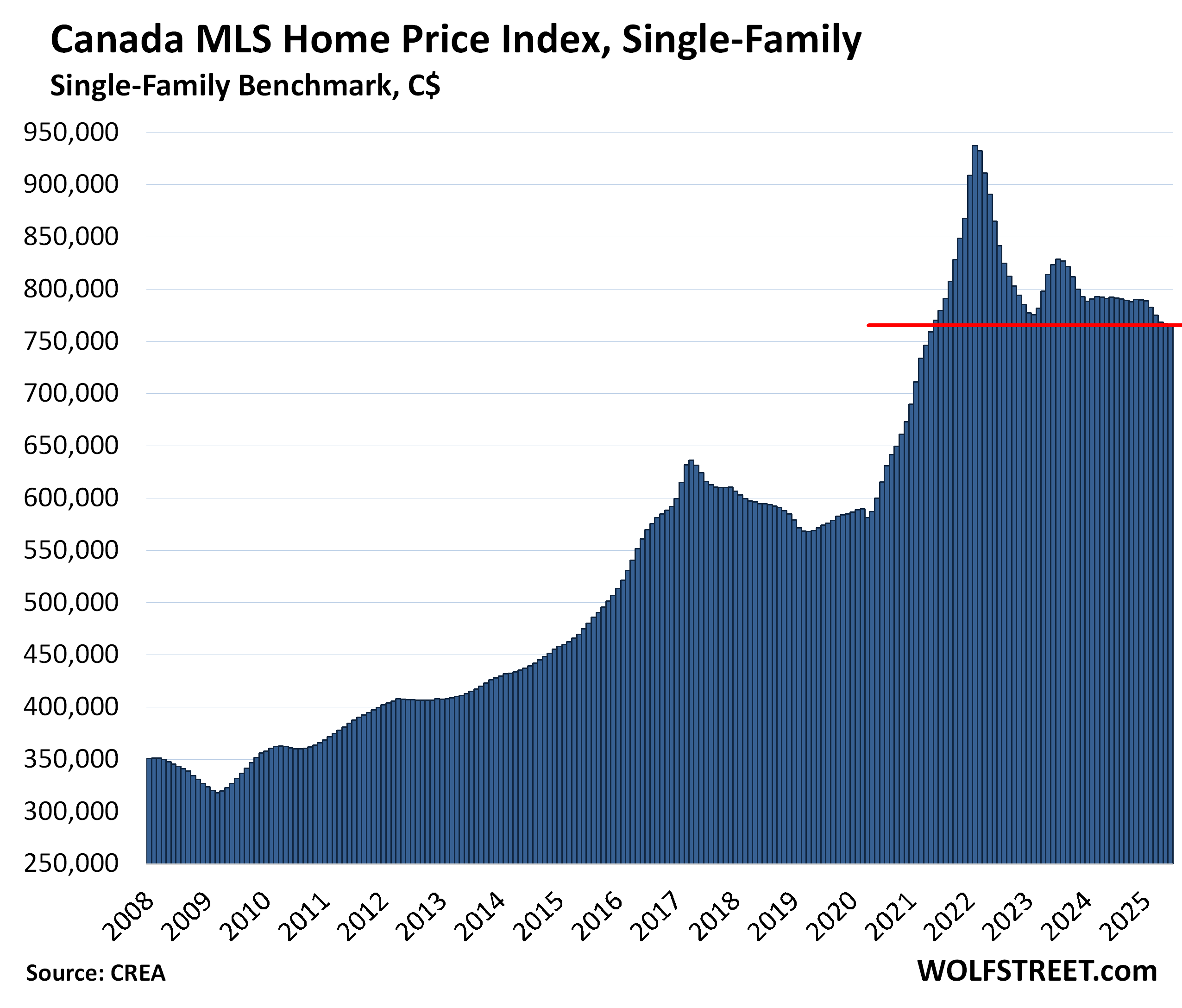
Condo prices across Canada fell by 0.7% in June from May, seasonally adjusted, to $488,400, the lowest level since June 2021. Year-over-year, the index fell by 5.2%.
Since peak-FOMO in March 2022, prices have dropped by 13.0%.
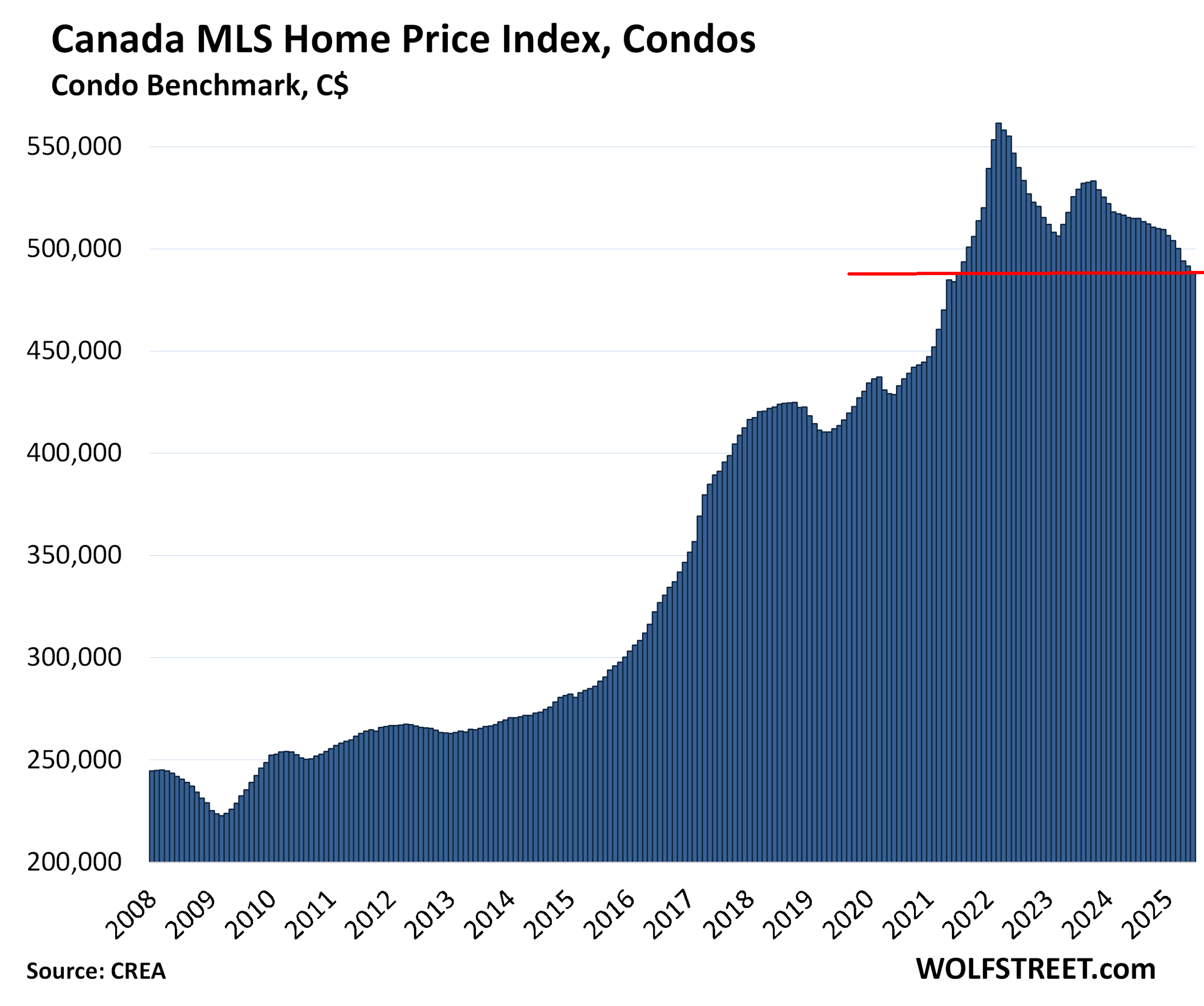
Prices in the major Canadian markets.
Greater Toronto Area, single-family MLS Home Price Benchmark Index:
- Month-to-month: -1.0%, to $1,195,200; the lowest since April 2021
- From peak in February 2022: -22.2%
- Year-over-year: -6.0%.
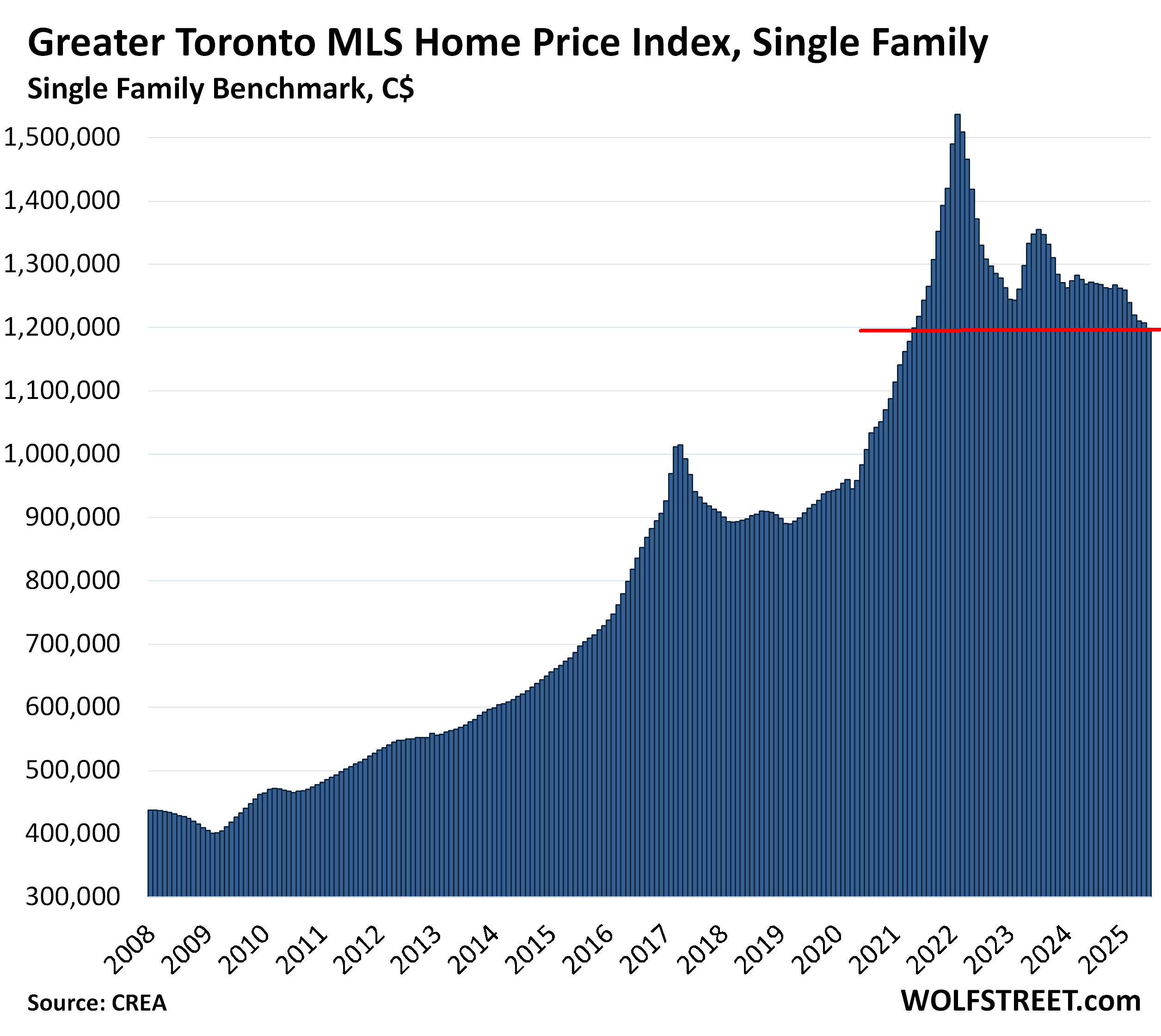
Greater Toronto Area, condo benchmark price:
- Month-to-month: -0.9% to $576,400, lowest since February 2021.
- From peak in April 2022: -19.5%
- Year-over-year: -7.8%.
Despite the massive problems that the condo market currently faces, prices haven’t dropped quite as much as prices of single-family homes (-22.2%).
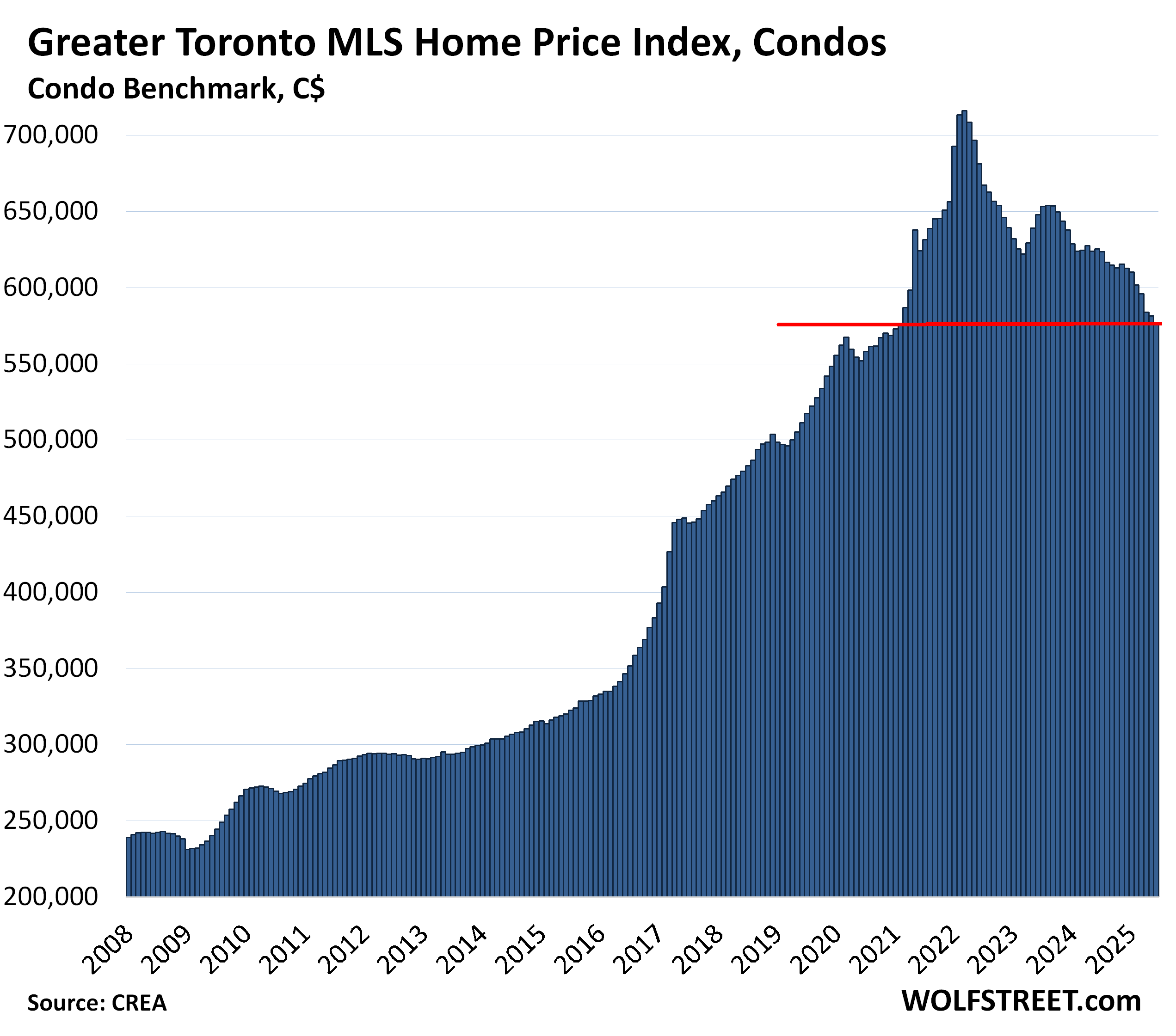
Hamilton-Burlington metro single family benchmark price (part of the “Greater Toronto and Hamilton Area”):
- Month-to-month: +0.6% to $854,700, back to February 2021
- From peak in February 2022: -24.3%
- Year-over-year: -6.1%.
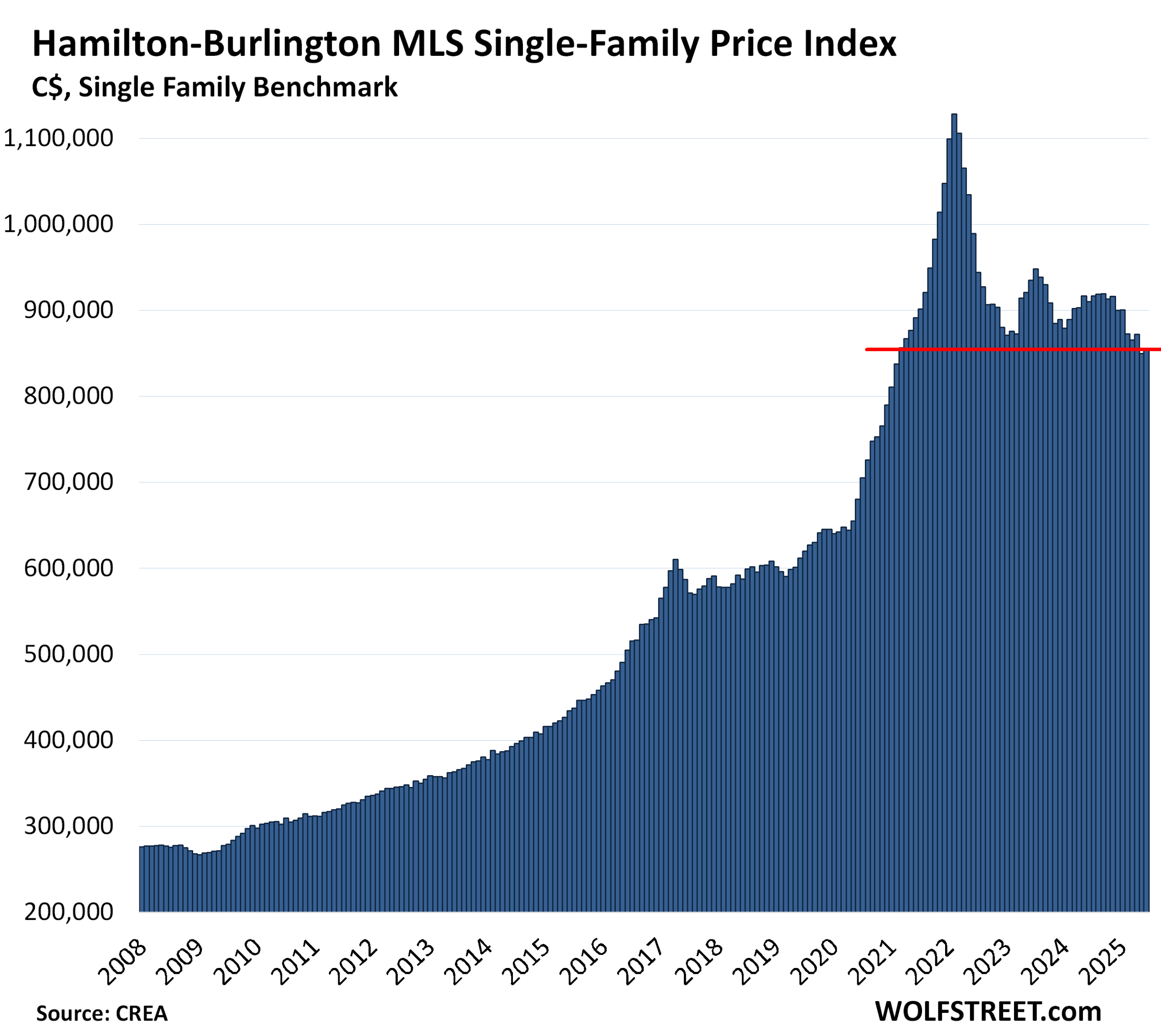
Hamilton-Burlington metro condo benchmark price:
- Month-to-month: -0.5% to $503,100, lowest since June 2021.
- From peak in April 2022: -20.5%
- Year-over-year: -6.5%.
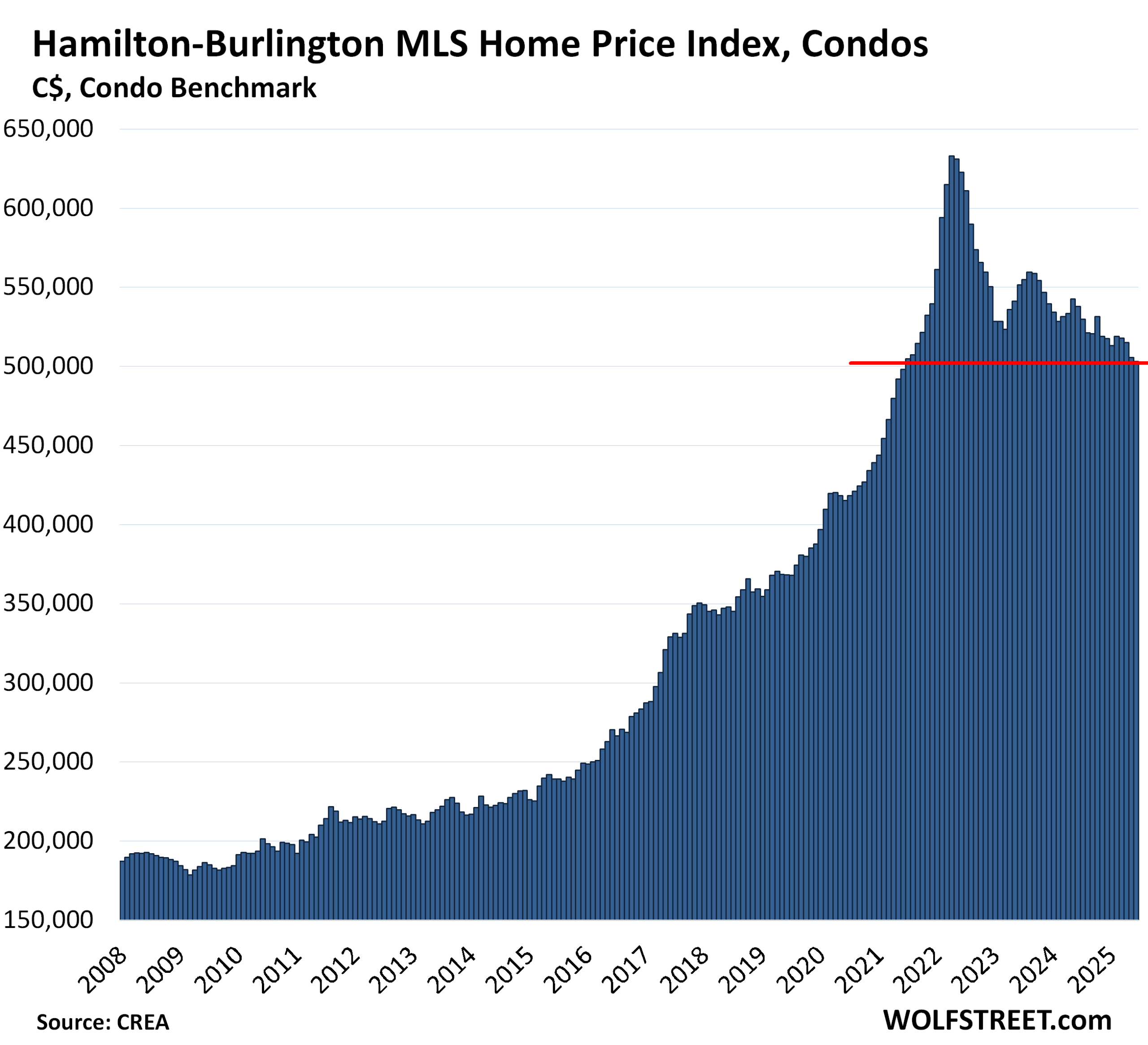
Greater Vancouver single-family benchmark price:
- Month-to-month: -0.1%, to $1,959,800, back to December 2021.
- From peak in March 2022: -5.2%
- Year-over-year: -3.1%.
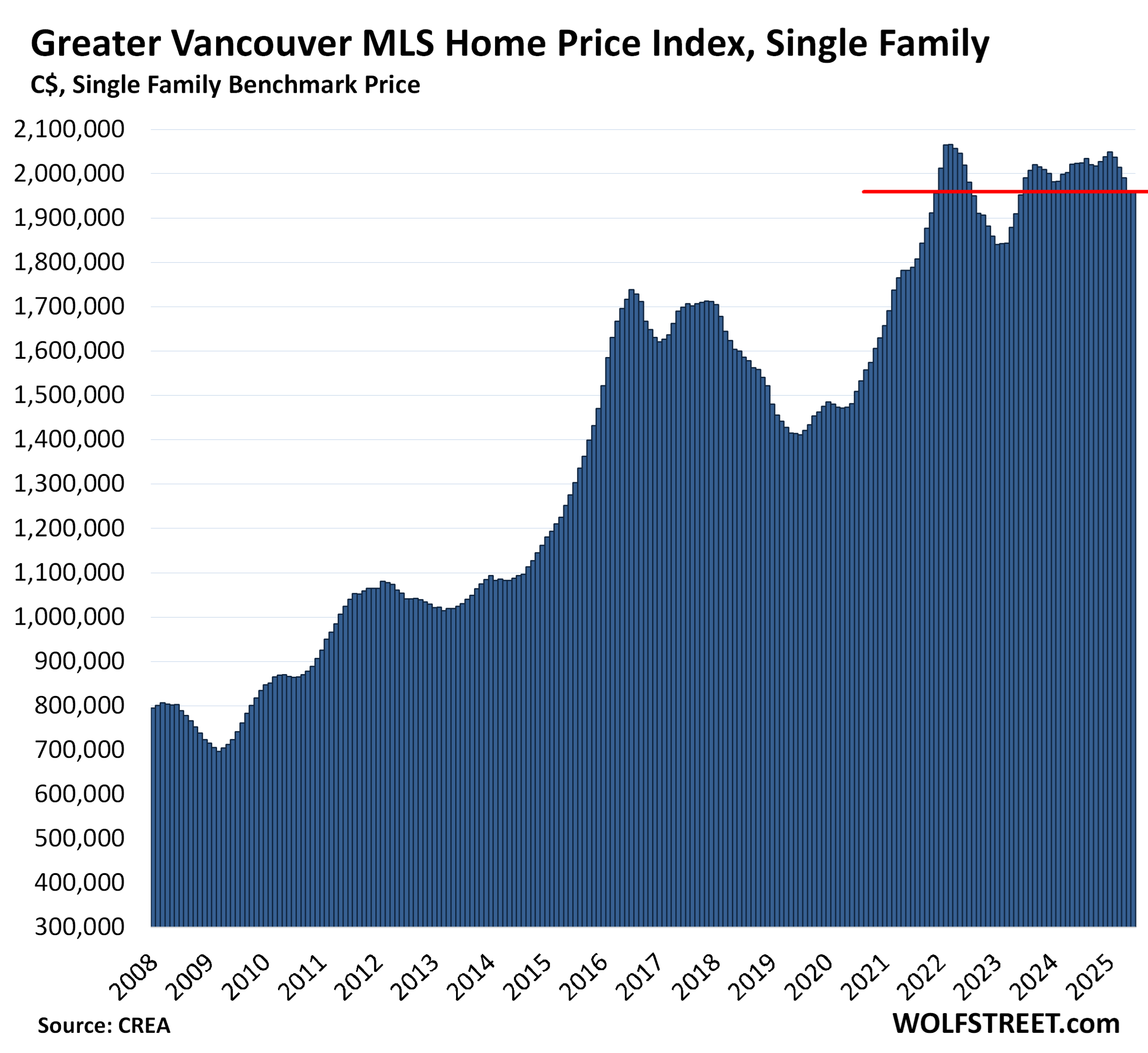
Greater Vancouver condo benchmark price:
- Month-to-month: -0.9%, to $738,100, where they’d first been in February 2022.
- From high in October 2023: -5.0%.
- Year-over-year: -3.4%, the 12th year-over-year decline in a row.
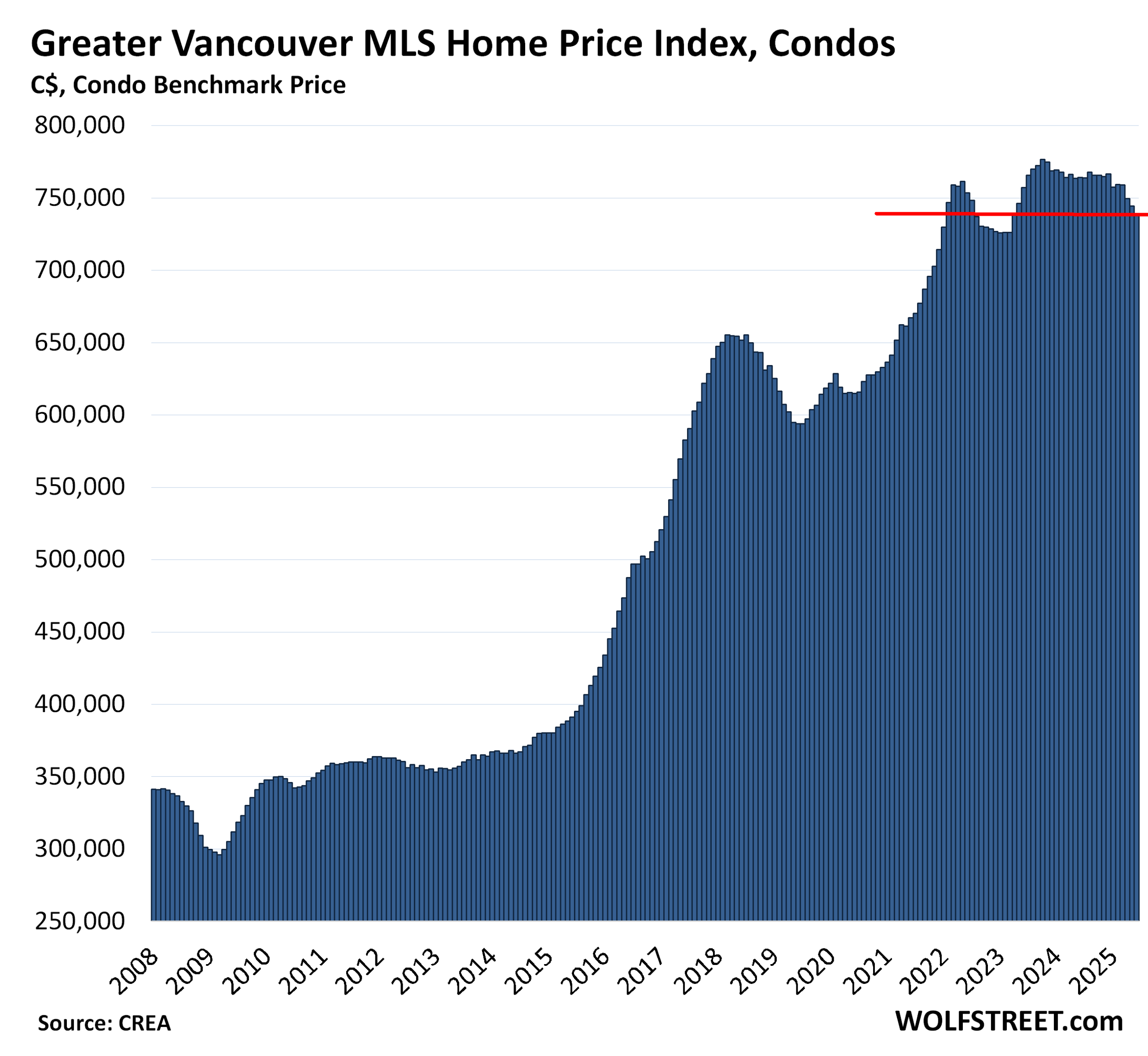
Victoria, single-family benchmark price:
- Month-to-month: roughly unchanged at $1,159,600, below where it had first been in December 2021
- From peak in March 2022: -8.2%
- Year-over-year: +2.1%.
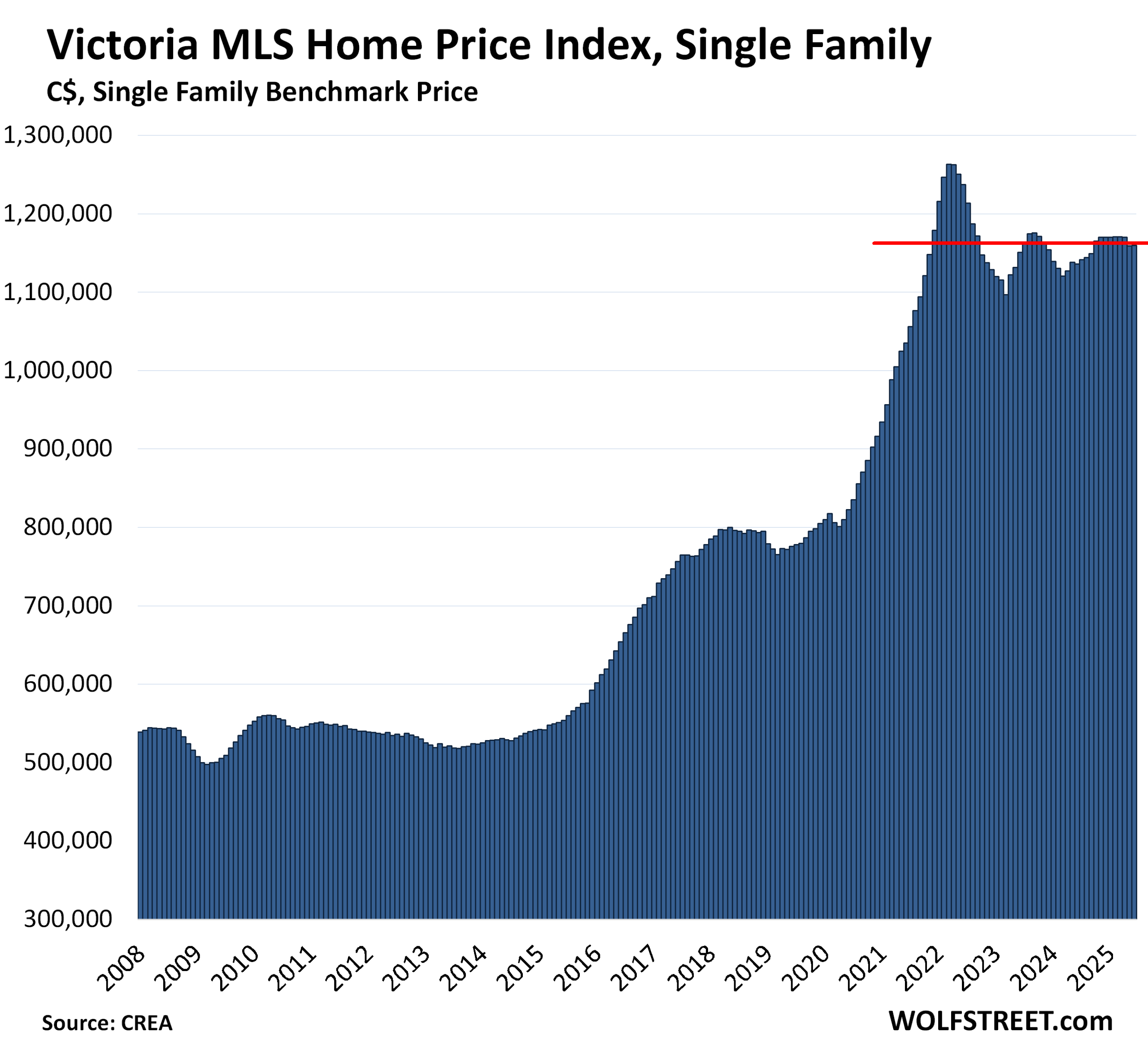
Victoria, condo benchmark price:
- Month-to-month: -0.4% to $553,400, where it had first been in December 2021
- From peak in March 2022: -8.2%
- Year-over-year: -1.1%.
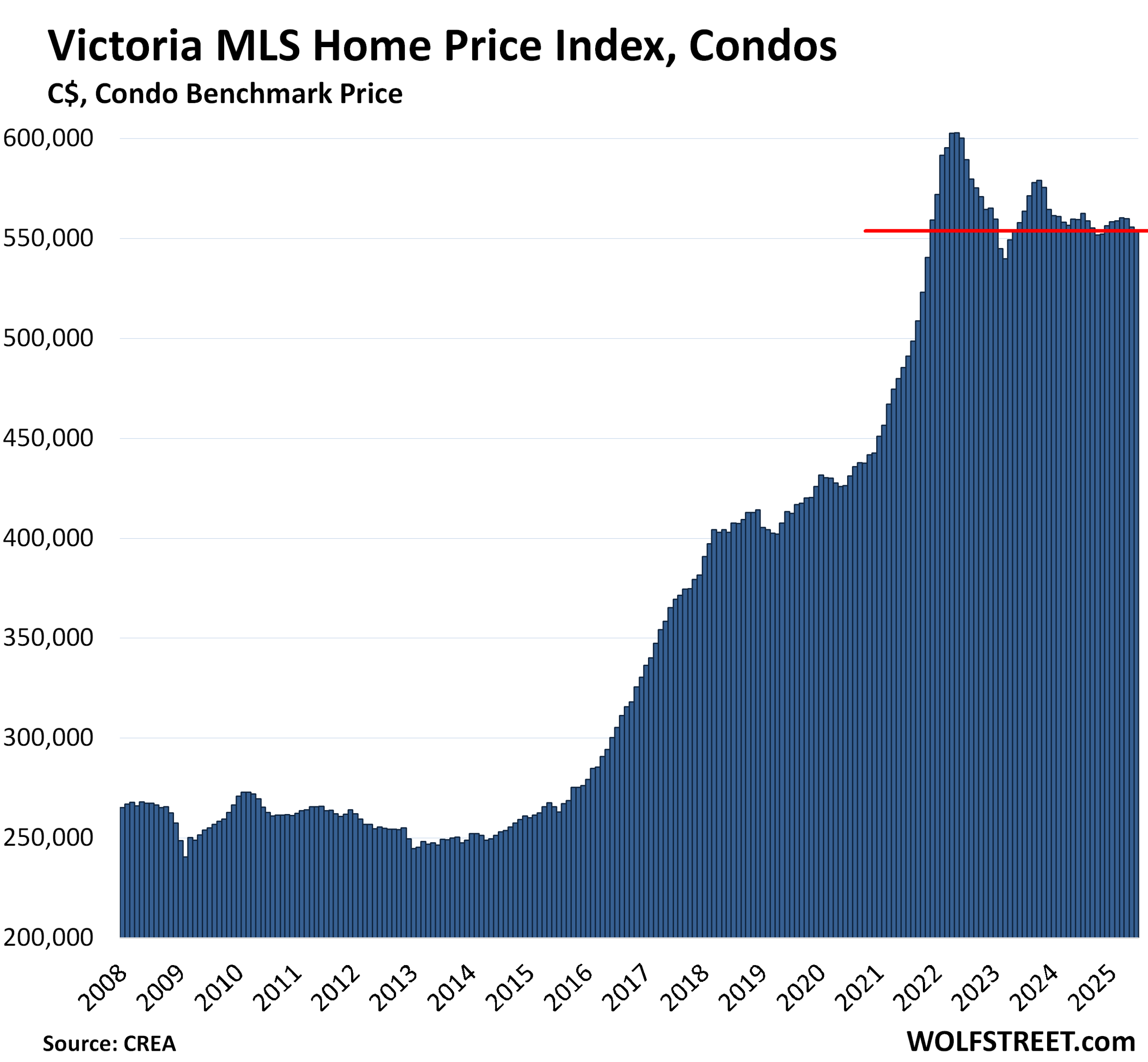
Ottawa, single family benchmark price:
- Month-to-month: +1.0% to $695,900 where it had first been in November 2021
- From peak in March 2022: -8.8%
- Year-over-year: +1.8%.
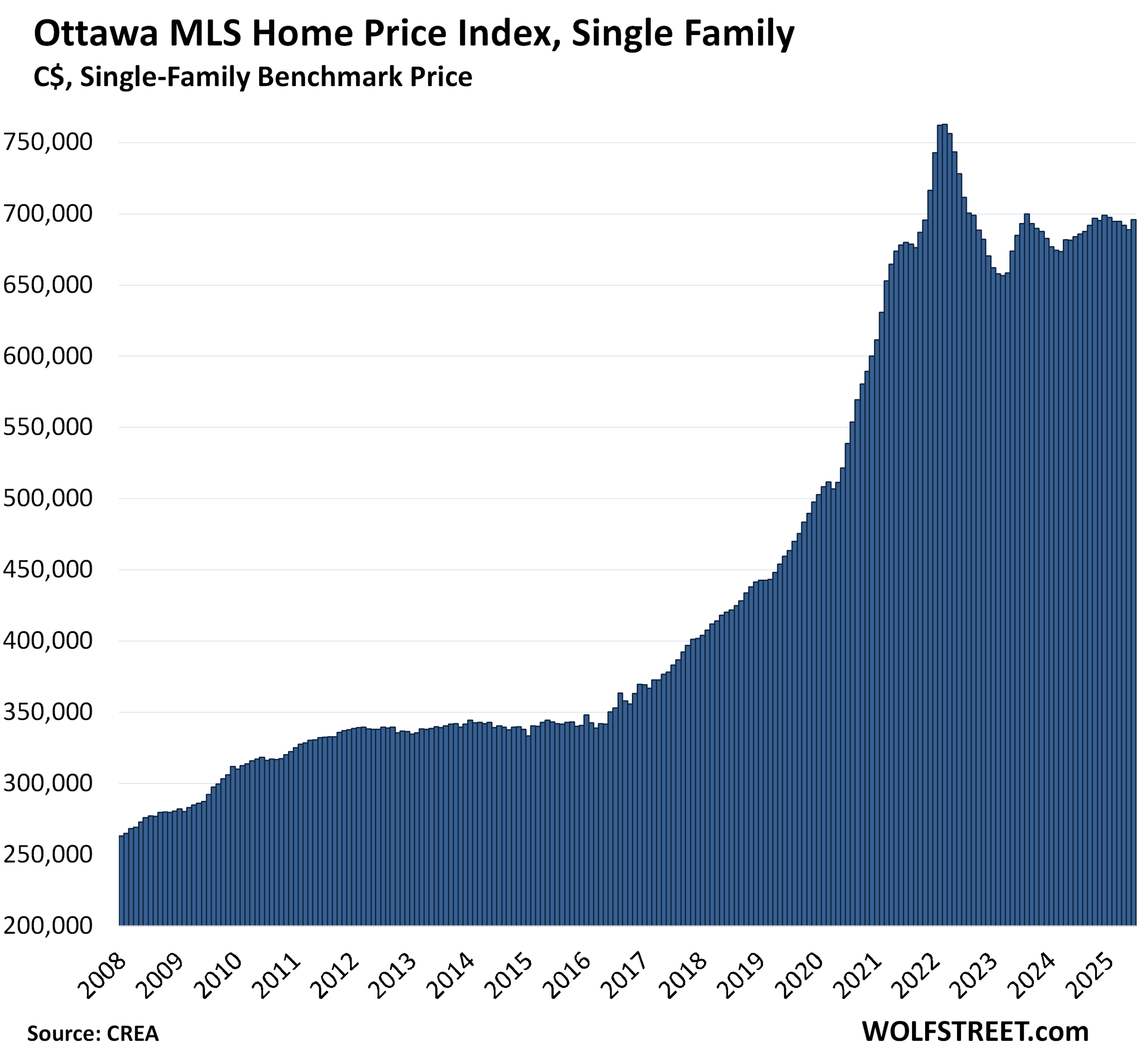
Ottawa, condo benchmark price:
- Month-to-month: +1.5% to $406,400, where it had been in May 2021
- From peak in March 2022: -9.3%
- Year-over-year: -0.6%.
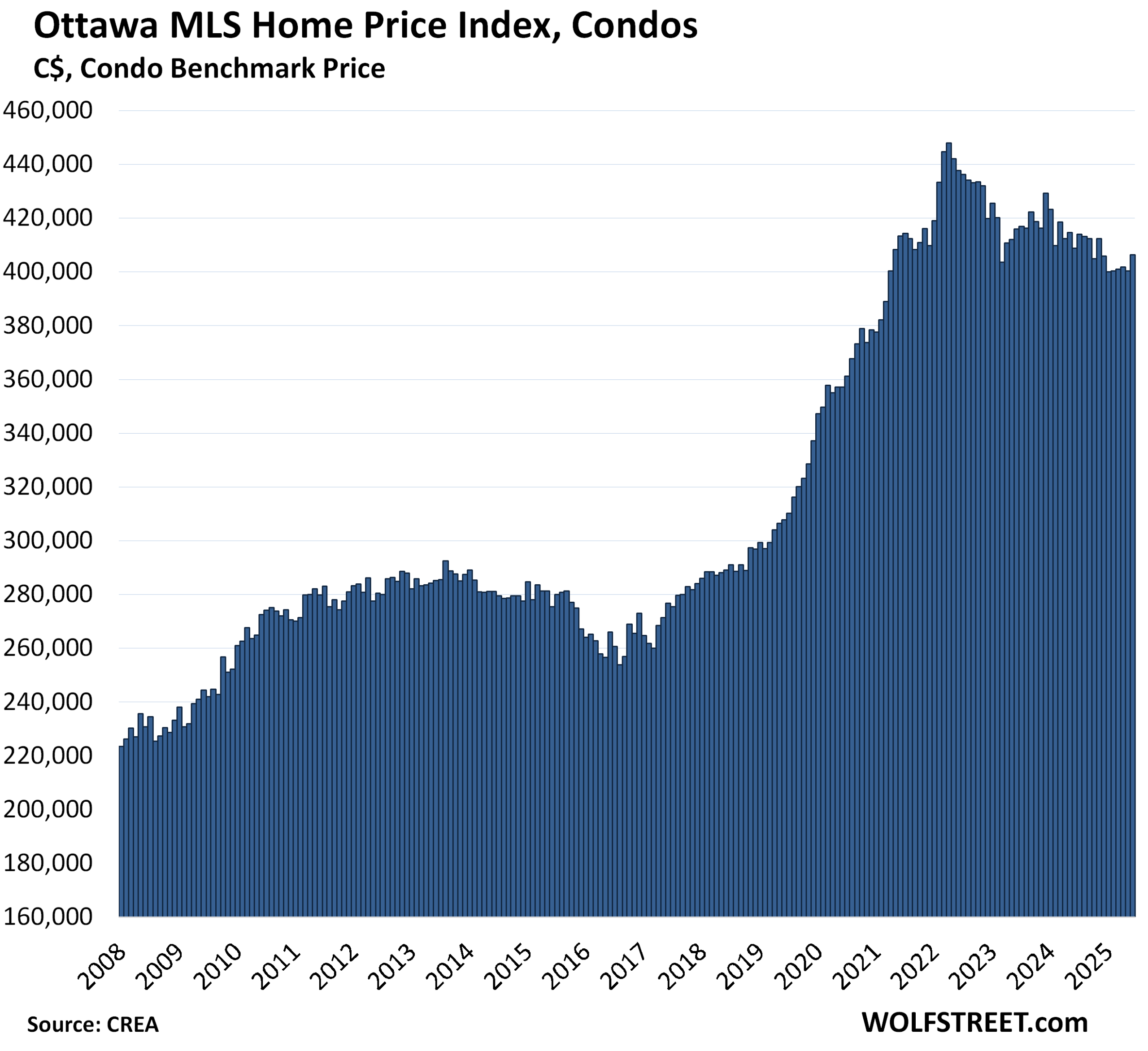
Calgary, single family benchmark price:
- Month-to-month: -0.5%, to $682,300, after a four-year spike totaling 55%.
- Year-over-year: +0.6%.
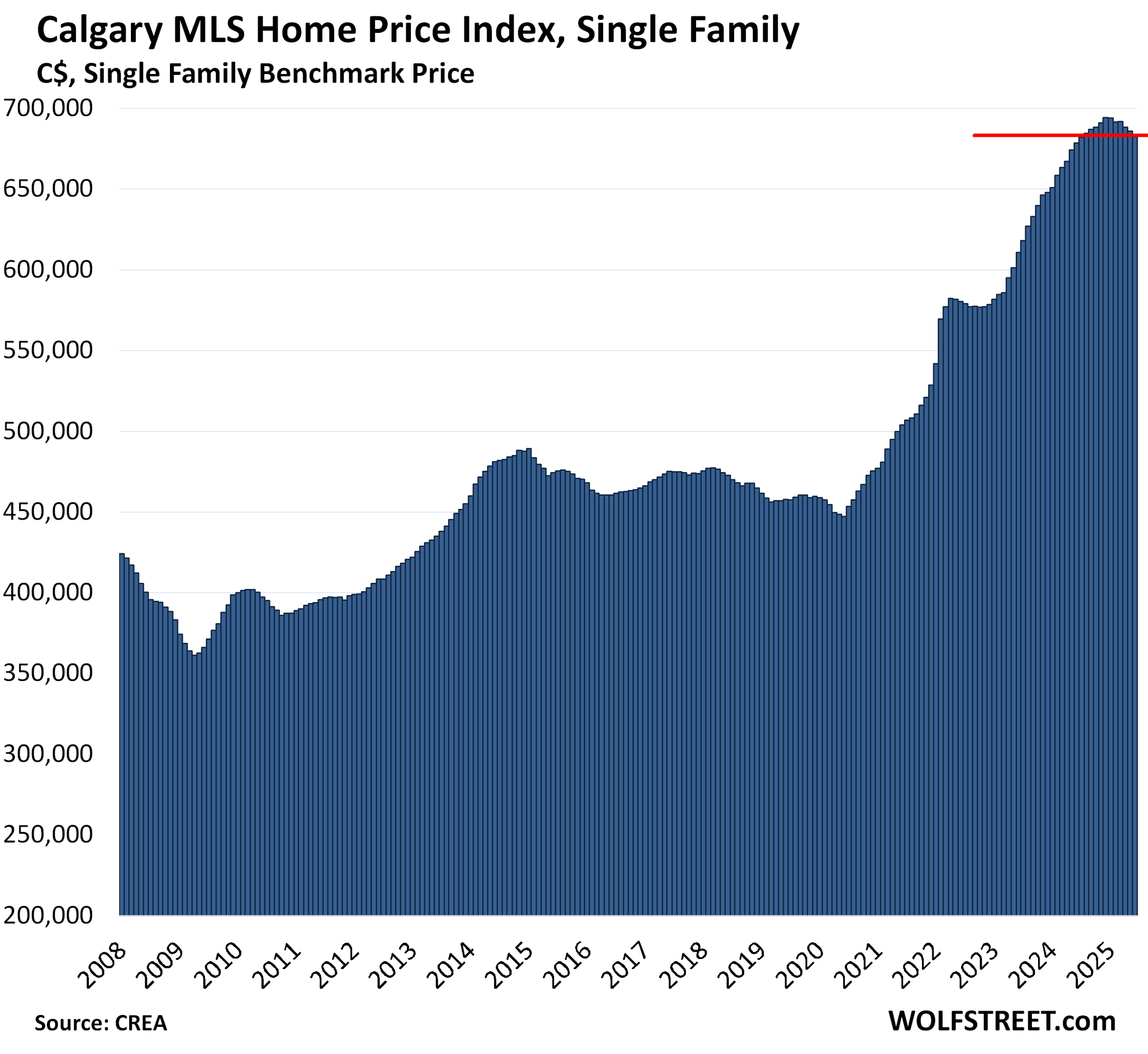
Calgary, condo benchmark price:
- Month-to-month: -0.5%, to $336,200.
- From peak in September 2024: -4.1%
- Year-over-year: -2.5%.
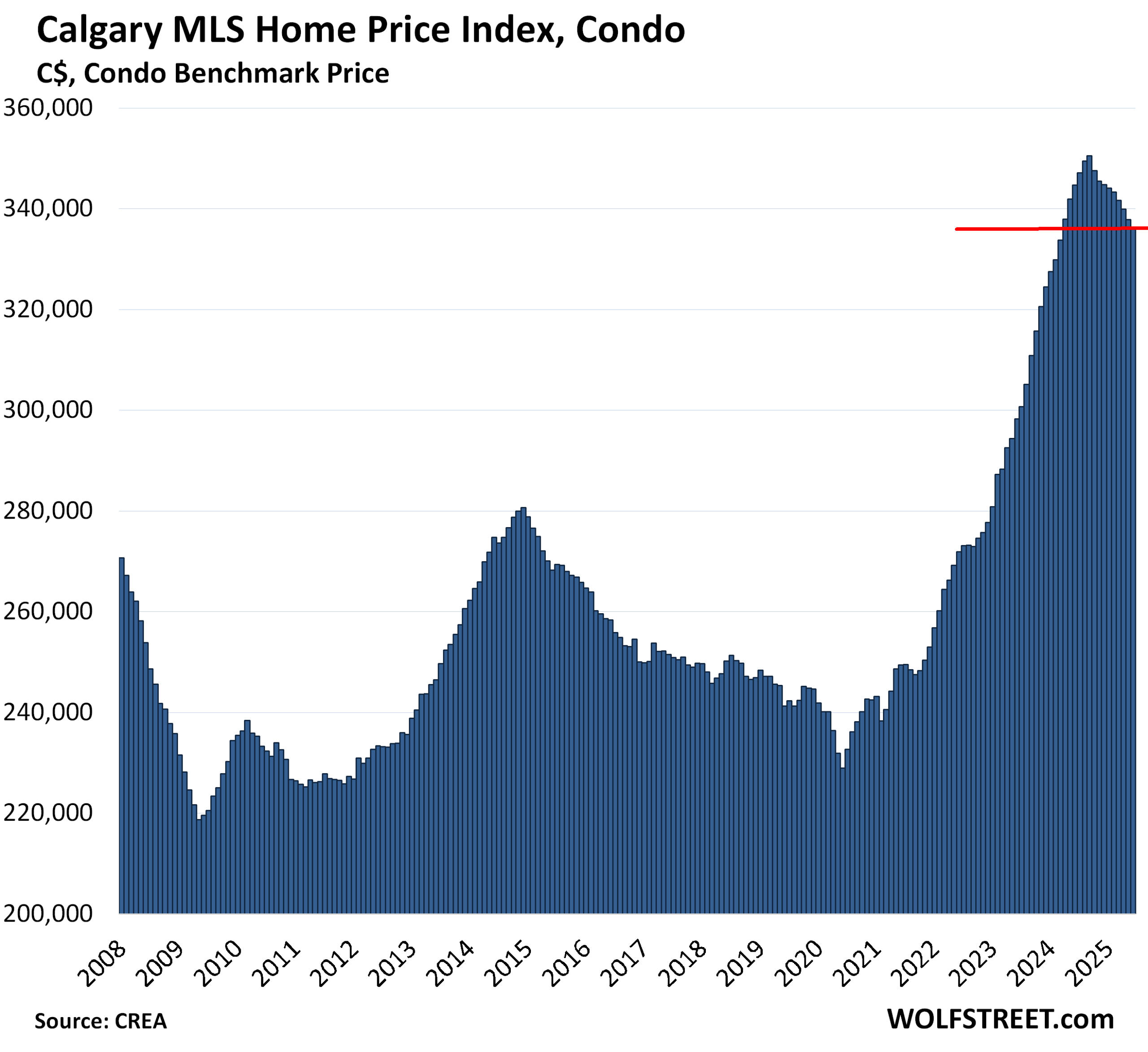
Montreal, single family benchmark price:
- Month-to-month: +0.4%, to $672,200, a new high.
- Year-over-year: +7.8%.
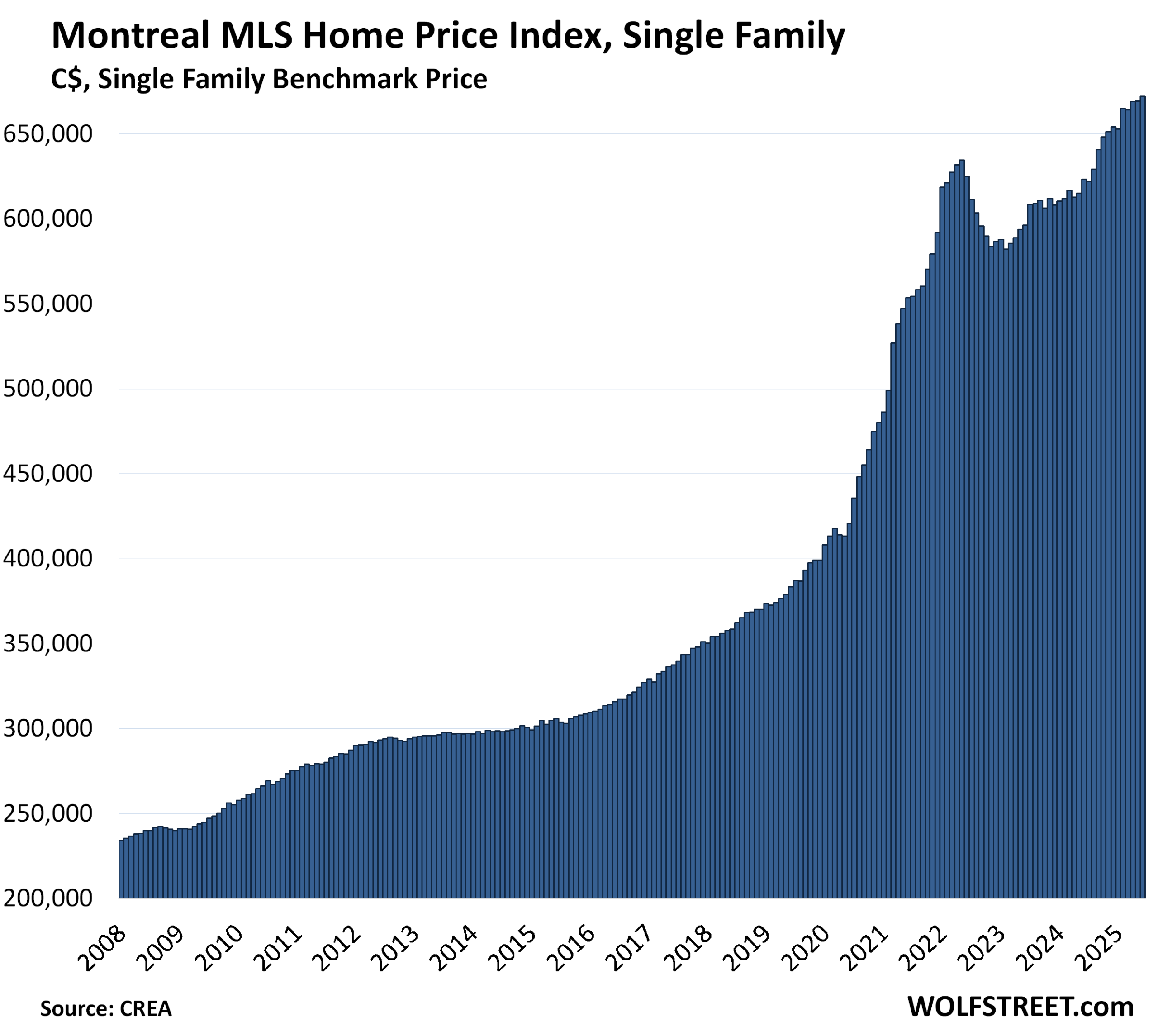
Halifax-Dartmouth, single family benchmark price:
- Month-to-month: +0.3% to $574,400 to new high.
- Year-over-year: +3.9%.
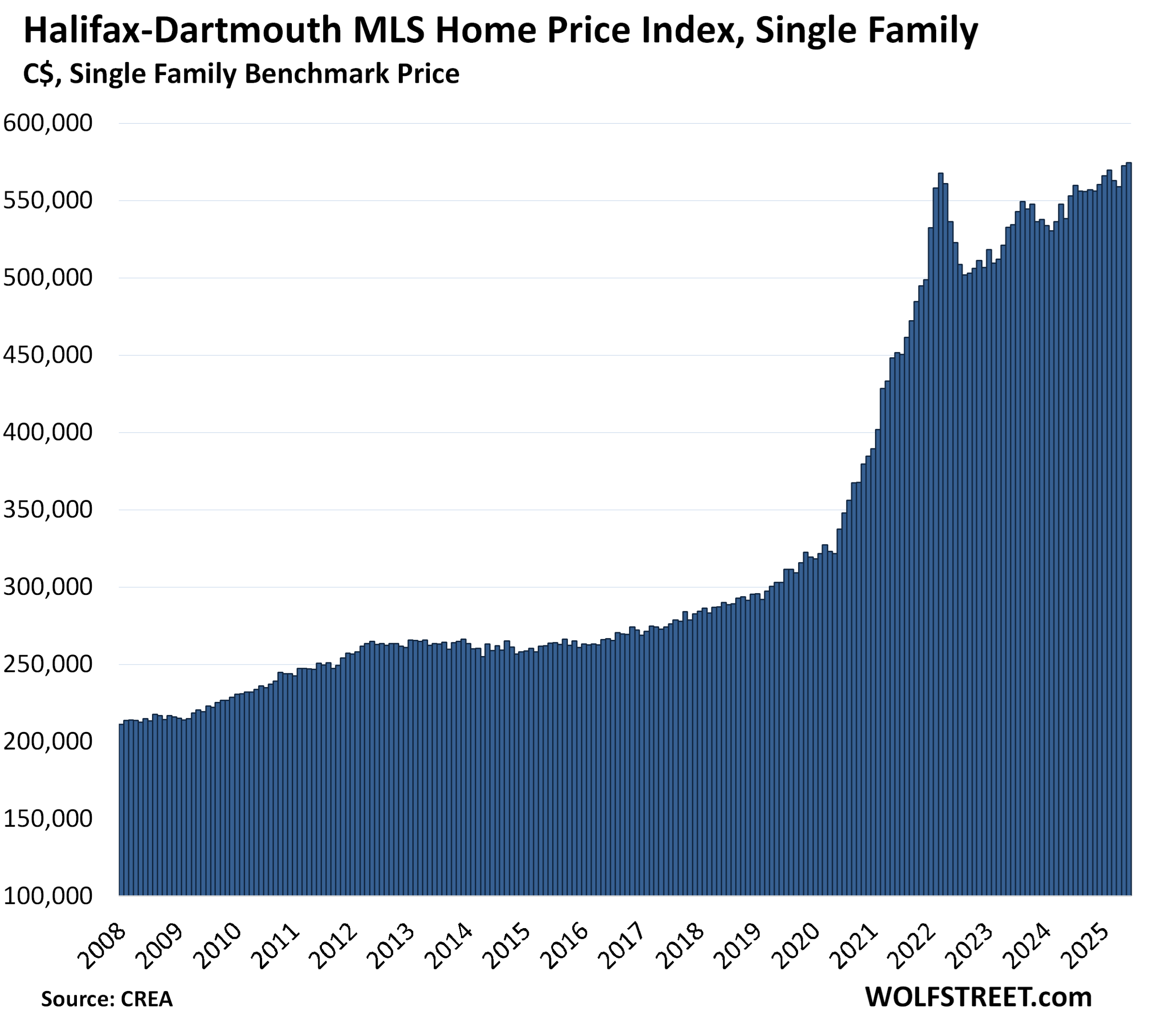
Edmonton, single-family benchmark price:
- Month-to-month: -0.2% to $494,200.
- Year-over-year: +9.8%
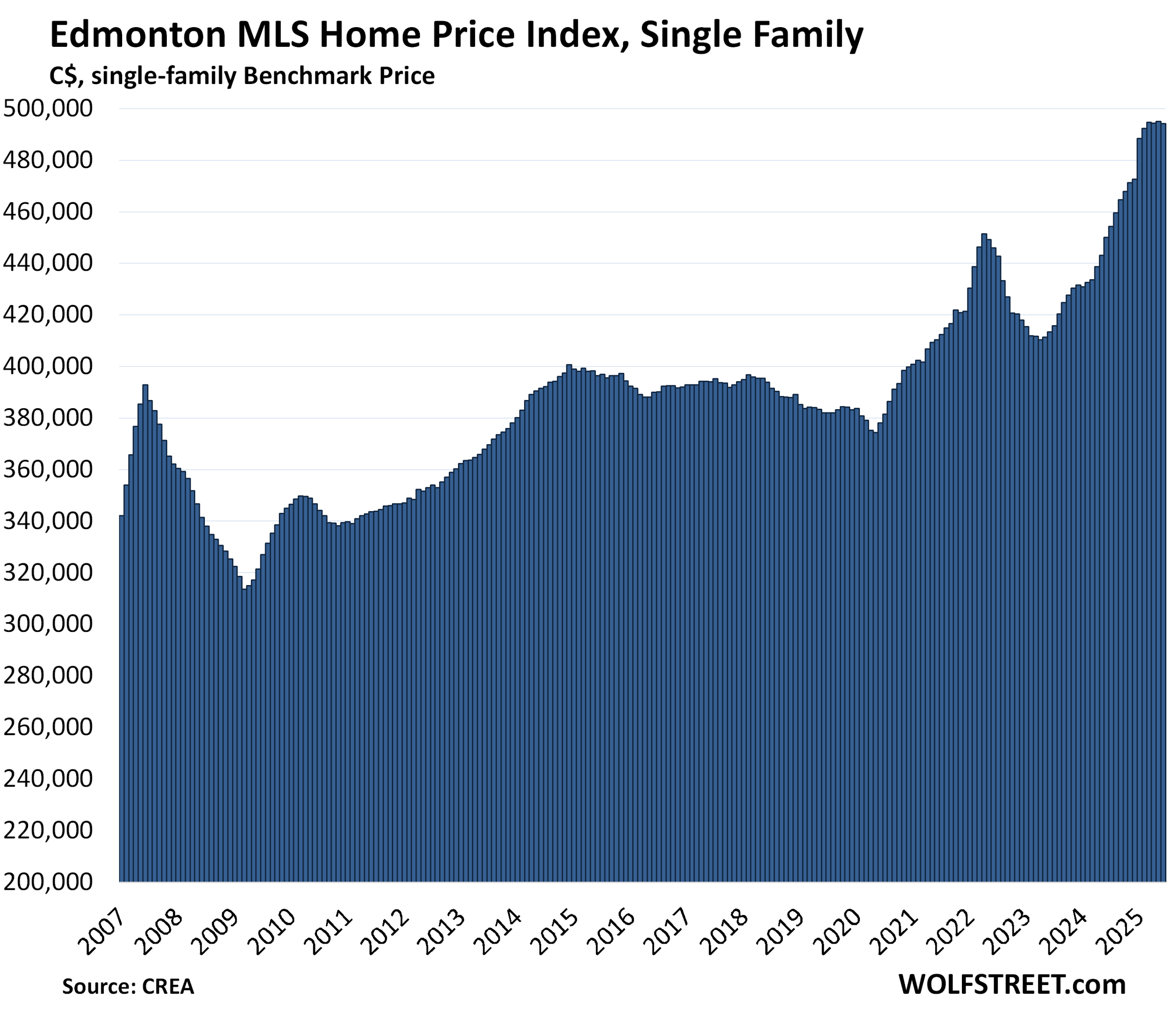
Quebec City Area, single-family benchmark price:
- Month-to-month: -0.1%, to $478,500, after a four-year 73% spike.
- Year-over-year: +16.2%
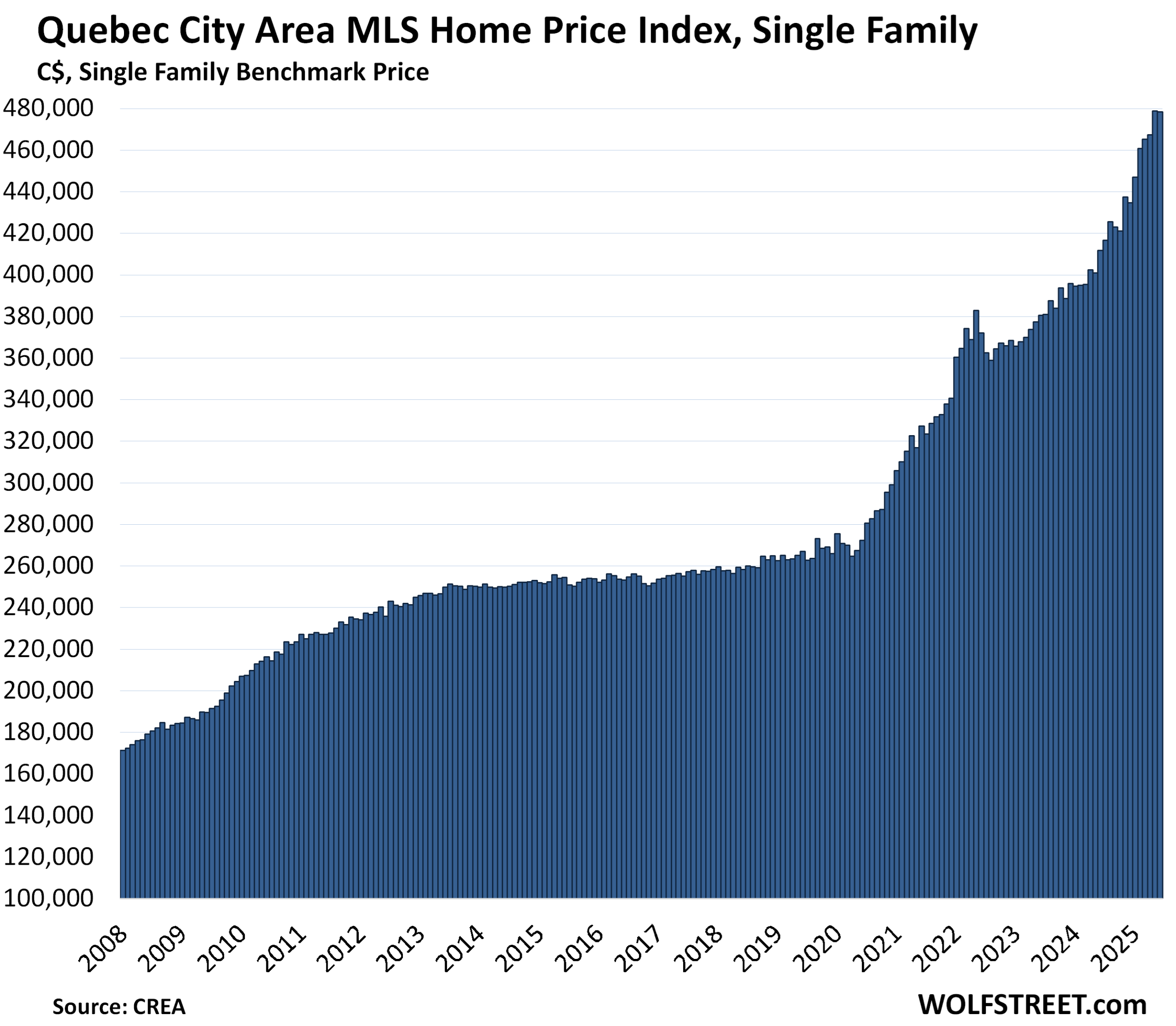
Winnipeg, single-family benchmark price:
-
- Month-to-month: +0.7% to $402,200
- Year-over-year: +7.5%
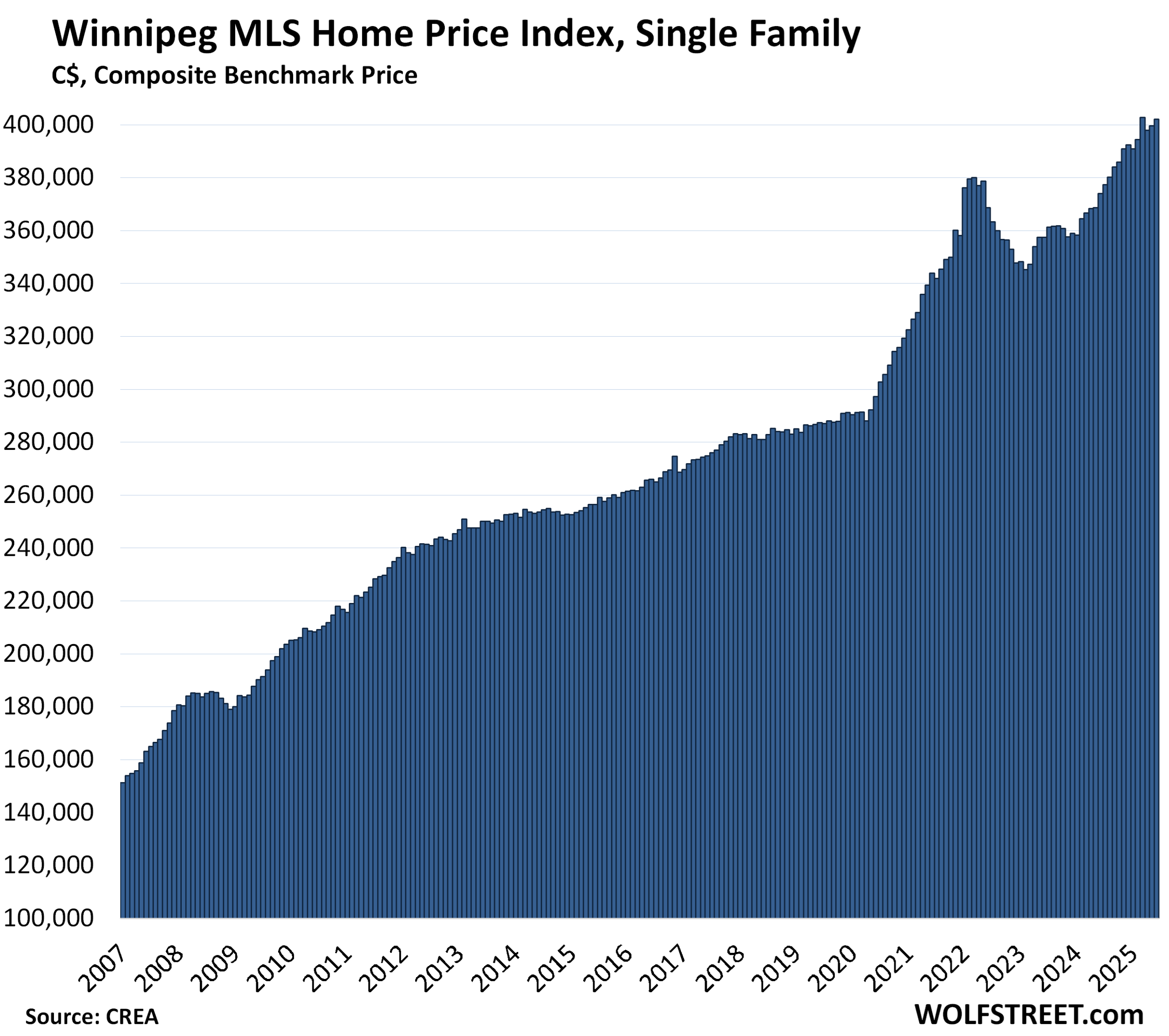
And in case you missed it: The US bond market reacts to the inflationary environment, to fears of a lax Fed, and to a Mississippi River of new debt…. 30-Year Treasury Yield Jumps to 4.96% despite “Solid” Auction, Long End of Yield Curve Steepens, Mortgage-Rate Spread Historically Wide
Enjoy reading WOLF STREET and want to support it? You can donate. I appreciate it immensely. Click on the mug to find out how:
![]()


South of the Canadian border, Las Vegas, NV appears to be the epicenter of the decline of the US residential real estate market.
Where I live corner lot properties aren’t selling in Markham, Ontario. Corner lot properties always sell first and at a premium to all other residential real estate.
I always viewed a corner lot as a downside. More road noise. Less privacy.
There’s a flip side. More awareness. More nosiness. Some folks like to know what’s going on around the block.
If you live in snow county that just gives you another sidewalk to clear.
I actually don’t like corner lots.
Maybe it’s just my town, but now you have setbacks on both roads (old houses are legal nonconforming), traffic on both roads, dogs crapping on both grass strips, less privacy, and more side-house/yard left unsecured.
I guess if it’s a new, super-cramped neighborhood, a corner might be preferable. But I always wondered why RE listings hype a corner lot…
The buble keeps going in Portugal too. The Portuguese statistics agency confirms the sharp rise in house prices and transactions in Portugal: an abnormal 18.7%.
“In the 1st quarter of 2025, the median house price of the 40,163 family dwellings transacted in Portugal was 1,951 €/m2, following a variation rate of 18.7% in relation to the 1st quarter of 2024 (15.5% in the previous quarter). The number of family dwellings sales in Portugal increased by 24.9% compared to the same quarter of 2024.”
Portuguese Statitics Office
And contrary to what is said about the property market in Portugal, only a minority of purchases are made by non-residents. And why are the Portuguese buying so many houses? Because strong immigration in the last 5 years has added more than 1 million new residents to Portugal, who rent their homes from the Portuguese landlords. “Buy-to-Let” is generating a sharp rise in property prices along with the “Airbnb” phenomenon, with Portugal being one of the most sought-after countries in Europe by Tourists for short-term stays.
Non-residents were important buyers at a time when “Golden Visas” were rare in Europe and Portugal was one of the few countries that offered this type of “passport”. But that was about 10 years ago. Today, immigrants are the strongest buyers of houses as foreign citizens, but residents now.
It seems Portugal is living one real estate buble but some believe it is sustainable. Who knows?
I’d like to see more serious analyses of the Portuguese property market outside Portugal, but the vast majority are stereotypes from people who don’t study the specific markets but who have an opinion on everyone and every market.
I spent many winters in Portugal, but now I choose to break the decades-old tradition and distance myself from it.
It’s a nightmare what the place has become, with millions of expats invading roads, streets, restaurants, and everything else, bidding up the prices, including on real estate. And it’s not just crowds, rising prices, but the quality of everything is substantially lower.
The nicest parts of Portugal are simply no longer livable.
Chinese are moving to Portuguese & Hungary instead of 🇺🇸. If you look up the immigration statistics, you will find a clear correlation between where Chinese move in & the housing price goes up that can’t be explained by local economic development.
Montreal becomes the new favor for them now so you see housing price drop in Toronto or Vancouver, both of which were their choices for decades.
There is moratorium of foreign buyers in Canada in cities with population of over 100k until Jan 2027, it’s been in place for while already. Also, Canada has a 1% tax on unused house to prevent buyers from collecting homes as a store of wealth. Canada can switch the switch before 2027 and invite foreign buyers back into their cities if they want to spur demand. The law has been successful in achieving its goals lowering prices for first time domestic buyers as Wolf article shows.
Please, can you confirm your sources for these comments?
“The Chinese are moving to Portugal and Hungary instead of 🇺🇸. If you consult immigration statistics, you’ll find a clear correlation between where the Chinese are moving and the rise in housing prices that can’t be explained by local economic development.”
You don’t have that correlation in the Portuguese case, but if you have independent sources to back up your assertions, you’ll help a lot to understand the formation of property prices in Portugal.
Around 20% of the jobs created in Engineering in Portugal, which feed the IT industry (AI, Cybersecurity, Data Management, etc) are foreigners, but almost none of them are Chinese, although there are a few Americans. And much of the immigration to Portugal is of highly qualified professionals, attracted by the countless start-ups that choose Portugal because of its high-tech ecosystem. And it is these professionals, some new millionaires due to the appreciation of their stock options, who are transforming the residential market in Portugal. Especially in Lisbon.
It’s common to see comments about other market and countries from people who make pompous but sterile statements that are out of touch with reality. Like this claim that the Chinese are moving to Portugal. It would be good for Portugal, but that’s not the case.
But I’ll be here to read your references and sources.
Chinese move to Portuguese as permanent residents (immigration).
Not sure how this will impact condo prices? My gut tells me to dun to the toilet:
U.S. President Trump reportedly indicated he’ll fire current Fed Chair Jerome Powell
He already “indicated” that in 2018 and 2019.
He also indicated he’d strip Rosie of citizenship, which of course he has no legal ability to do. He runs his mouth on all sorts of things. I don’t know why people listen to the things that are obviously ragebait
The original headline was based on what a “senior administration official” had told the news outlet.
Powell is another test of the separation of powers. So far, Congress and SCOTUS have failed to withstand the authoritarian creep. If Powell is pushed out, that will signal yet another erosion of the foundation of our checks and balances.
New and improved headline in the WSJ:
“Trump Denies He Is Planning to Attempt to Fire Fed Chair Powell”
I’m no fan of Trump (or any politician) but with most major news outlets so anti-Trump today I’m pretty sure if I mailed an anonymous letter that just said “Apartment Investor” in the return address area (like the letter i just mailed Wolf with a cash donation inside) saying something negative about the president the media would print it saying “anonymous source says”…
Yes, I was stupid to fall for that — but, that process reinforces my gut instinct to wait until I see factual data on tariff impacts — before reallocating cash to any investments. I’m very skeptical about how that plays out, and I’ll wait for Real #s.
Although I’m a terrible customer here, your charts are valuable and your mkt insights are predictably stable and useful.
With that in mind, I feel Real data, like Real GDP or annualized data on charts will clear up the tsunami of deafening noise related to TACO and the garbage I just reacted to with Powell.
For decades, we’ve been evolving into noisier, algorithmic click-baiting, nanosecond kneejerk-reactive casino-style speculation.
I appreciate the time you take, to provide useful information!
Maybe he forgot that he picked him for the job?
Lately he has been claiming that Biden appointed him. Not that anyone cares about the facts any more.
Observing in my older suburban neighborhood (west GTA) modest SFH (bungalows or 1.5 stories) are selling fairly well. Modest homes <$2M. Not sure about the larger homes.
GTA Condos I'm shocked if they are resilient as Wolf reports.
Anywhere you go in the city and there are fenced off areas (old strip malls, former car dealerships etc.) for massive number of new condo projects. Could be eyesores for quite a while as I think the investor base has shrunk.
Since they don’t have fixed 30 years mortgage, wonder how much of that play a huge part in pricking their bubble seemingly much faster than certain parts of HCOL areas like SoCal, which only saw very slow and small decline so far..
It’s almost like “free money” isn’t the only explanation for house price runup.
Hot Chinese money flooded into Canada from the Chinese manufacturers who got rich after Western jobs were offshored there. Pure and simple, they were looking for price appreciation. And there was massive money laundering (which the government knew about, but did nothing to stop). Money launderers don’t care what they pay for a property; they just want to park their money.
They have bid up every city in Canada. You can see there is still some upside in Quebec, so that’s why they’re still there.
Canada has been destroyed. Greed.
The Chinese in Canada have become the epicenter for global money laundering, phentynol production and almost every other drug production. Politicians know this but are bought (read The Bureau) including our Prime Ministers. Any intelligence reports are quietly dismissed and hidden. The Canadian statutes are so weak, bring known “big whales” to court, with obvious evidence still allows the narco to be free.
Hey wolf,
Unrelated but just had to show you this quote
David M. Solomon, Goldman’s chief executive, said in a statement: “Developments rarely unfold in a straight line.”
😀
Obviously. Which is why the Wolf Street Dictum “Nothing Goes to Heck in a Straight Line” is imprinted on the Wolf Street mugs (three-color art by Erika “Kitten” Lopez, a San Francisco writer and artist).
I think the pandemic totally altered human behavior — technology accelerated wildly, and the concepts of YOLO and FOMO entirely changed risk and reward perceptions — which connects to social media algorithms that fragment and polarize virtually everyone’s reality.
The amplification of generational demographic peak baby boomers — collided with pandemic shock and has resulted in a population, that’s more resistant to shocks and instability — a formation of greater insulation — resilience — and the capacity to endure more stress.
Hence, what’s missing today in most markets, is fear or stress. Instead of financially stressed homeowners, we have a large population that’s wealthier and …. Resilient. In this new and improved casino, it’s easy to win and very little downside risk, it’s all easy to learn and AI is your buddy.
That explains people buying stocks, as if there’s nothing but upside and homeowners delisting, waiting for higher profits — nobody envisions or foresees losing, if anything, this slight blip downward is just a short pause, until prices double.
Random example:
“ With median list prices essentially unchanged over the past two years, it’s clear that many sellers remain anchored to peak-era expectations,” says Krimmel. “While the market may be becoming more buyer-friendly, sellers still hold a trump card: delist the home and fish for that high asking price at a later date.”
Sure, it’s Russian roulette — but YOLO
Selling the condo in Calgary; the agents are planning for a bidding war (ok, that sounds dramatic, but it’s in a very desirable location). Prices have gone sideways in Calgary….what has gone down are asking rents…but insurance, condo fees, maintenance are all up up up…ie. the bad kind of inflation. So, hopefully selling at the top will be a good move. The investment made sense at the time, bought for cash in around 2017. Wolf’s chart is very accurate, bought for around 240, selling for 340 haha!
Dealing with taxes/tenants/repairs ect…while on the other side of the world is a huge headache and just isn’t worth it considering there are easier ways to make money out there.
You made your money! Take it and run! If you get just one decent-enough bid, take it and run. On this side of the curve, holding out for a better offer might force you to chase it down. This happened a lot here in 2006-2008.
Canadian real estate’s demand balance just saw the weakest June in well over a generation. The national SNLR fell to 49.3% in June, down 2.2 points from last year. The erosion was driven by new listings (+8%) advancing at more than double the rate of sales (+3.5%). Last month was the weakest SNLR for June since 1995, which was during the country’s largest real estate downturn ever.
Despite a relatively small correction following 26 years of generally rising prices, market conditions now resemble historical warnings. It was the fourth consecutive June to see the SNLR drop, marking an unprecedented 23.8 point drop from peak to trough. The drop reflects supply advancing 32% faster than demanded, a move that hasn’t been exceeded since the 41% drop between 1988 and 1990, which led to the largest real estate price correction in history. That period marked the last significant national housing downturn and bubble correction in Canada.